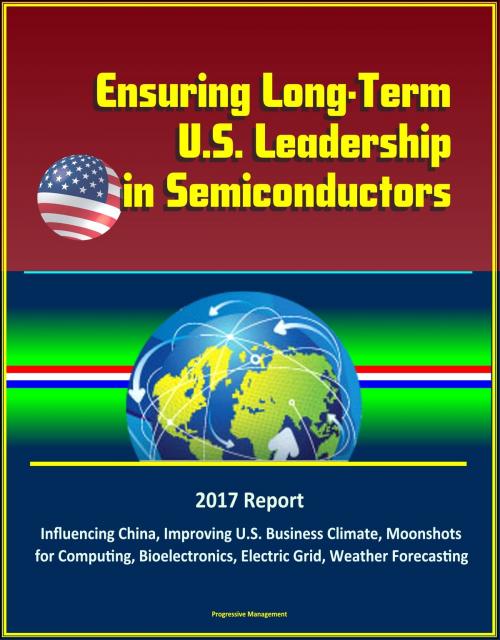Ensuring Long-Term U.S. Leadership in Semiconductors: 2017 Report, Influencing China, Improving U.S. Business Climate, Moonshots for Computing, Bioelectronics, Electric Grid, Weather Forecasting
Nonfiction, Science & Nature, Technology, Electronics, Semiconductors, Computers, Computer Hardware, Input-Output Equipment| Author: | Progressive Management | ISBN: | 9781370207176 |
| Publisher: | Progressive Management | Publication: | January 21, 2017 |
| Imprint: | Smashwords Edition | Language: | English |
| Author: | Progressive Management |
| ISBN: | 9781370207176 |
| Publisher: | Progressive Management |
| Publication: | January 21, 2017 |
| Imprint: | Smashwords Edition |
| Language: | English |
This excellent report has been professionally converted for accurate flowing-text e-book format reproduction. Semiconductors are essential to modern life. Progress in semiconductors has opened up new frontiers for devices and services that use them, creating new businesses and industries, and bringing massive benefits to American workers and consumers as well as to the global economy. Cutting-edge semiconductor technology is also critical to defense systems and U.S. military strength, and the pervasiveness of semiconductors makes their integrity important to mitigating cybersecurity risk.
Today, U.S. semiconductor innovation, competitiveness, and integrity face major challenges. Semiconductor innovation is already slowing as industry faces fundamental technological limits and rapidly evolving markets. Now a concerted push by China to reshape the market in its favor, using industrial policies backed by over one hundred billion dollars in government-directed funds, threatens the competitiveness of U.S. industry and the national and global benefits it brings. The report looks at these challenges in greater detail.
The core finding of the report is this: only by continuing to innovate at the cutting edge will the United States be able to mitigate the threat posed by Chinese industrial policy and strengthen the U.S. economy. Thus, the report recommends and elaborates on a three pillar strategy to (i) push back against innovation-inhibiting Chinese industrial policy, (ii) improve the business environment for U.S.-based semiconductor producers, and (iii) help catalyze transformative semiconductor innovation over the next decade. Delivering on this strategy will require cooperation among government, industry, and academia to be maximally effective.
The Chinese government provides a range of subsidies to strengthen domestic production. These subsidies are driven in part by a desire to decrease reliance on foreign suppliers for technologies deemed critical to Chinese national security, and in part by a desire to capture market share for economic reasons. China's subsidies to the semiconductor industry include capital subsidies that encourage foreign companies to locate facilities in China as well as subsidized capital to domestic companies and investment firms to use in the acquisition of foreign companies and technologies. While China's subsidies are largely zero-sum in their impact on foreign semiconductor producers (companies, workers, or both) in the same market segment, they may not be zero-sum to other market participants (whether to participants in other parts of the semiconductor supply chain or to users of semiconductors).
This excellent report has been professionally converted for accurate flowing-text e-book format reproduction. Semiconductors are essential to modern life. Progress in semiconductors has opened up new frontiers for devices and services that use them, creating new businesses and industries, and bringing massive benefits to American workers and consumers as well as to the global economy. Cutting-edge semiconductor technology is also critical to defense systems and U.S. military strength, and the pervasiveness of semiconductors makes their integrity important to mitigating cybersecurity risk.
Today, U.S. semiconductor innovation, competitiveness, and integrity face major challenges. Semiconductor innovation is already slowing as industry faces fundamental technological limits and rapidly evolving markets. Now a concerted push by China to reshape the market in its favor, using industrial policies backed by over one hundred billion dollars in government-directed funds, threatens the competitiveness of U.S. industry and the national and global benefits it brings. The report looks at these challenges in greater detail.
The core finding of the report is this: only by continuing to innovate at the cutting edge will the United States be able to mitigate the threat posed by Chinese industrial policy and strengthen the U.S. economy. Thus, the report recommends and elaborates on a three pillar strategy to (i) push back against innovation-inhibiting Chinese industrial policy, (ii) improve the business environment for U.S.-based semiconductor producers, and (iii) help catalyze transformative semiconductor innovation over the next decade. Delivering on this strategy will require cooperation among government, industry, and academia to be maximally effective.
The Chinese government provides a range of subsidies to strengthen domestic production. These subsidies are driven in part by a desire to decrease reliance on foreign suppliers for technologies deemed critical to Chinese national security, and in part by a desire to capture market share for economic reasons. China's subsidies to the semiconductor industry include capital subsidies that encourage foreign companies to locate facilities in China as well as subsidized capital to domestic companies and investment firms to use in the acquisition of foreign companies and technologies. While China's subsidies are largely zero-sum in their impact on foreign semiconductor producers (companies, workers, or both) in the same market segment, they may not be zero-sum to other market participants (whether to participants in other parts of the semiconductor supply chain or to users of semiconductors).















